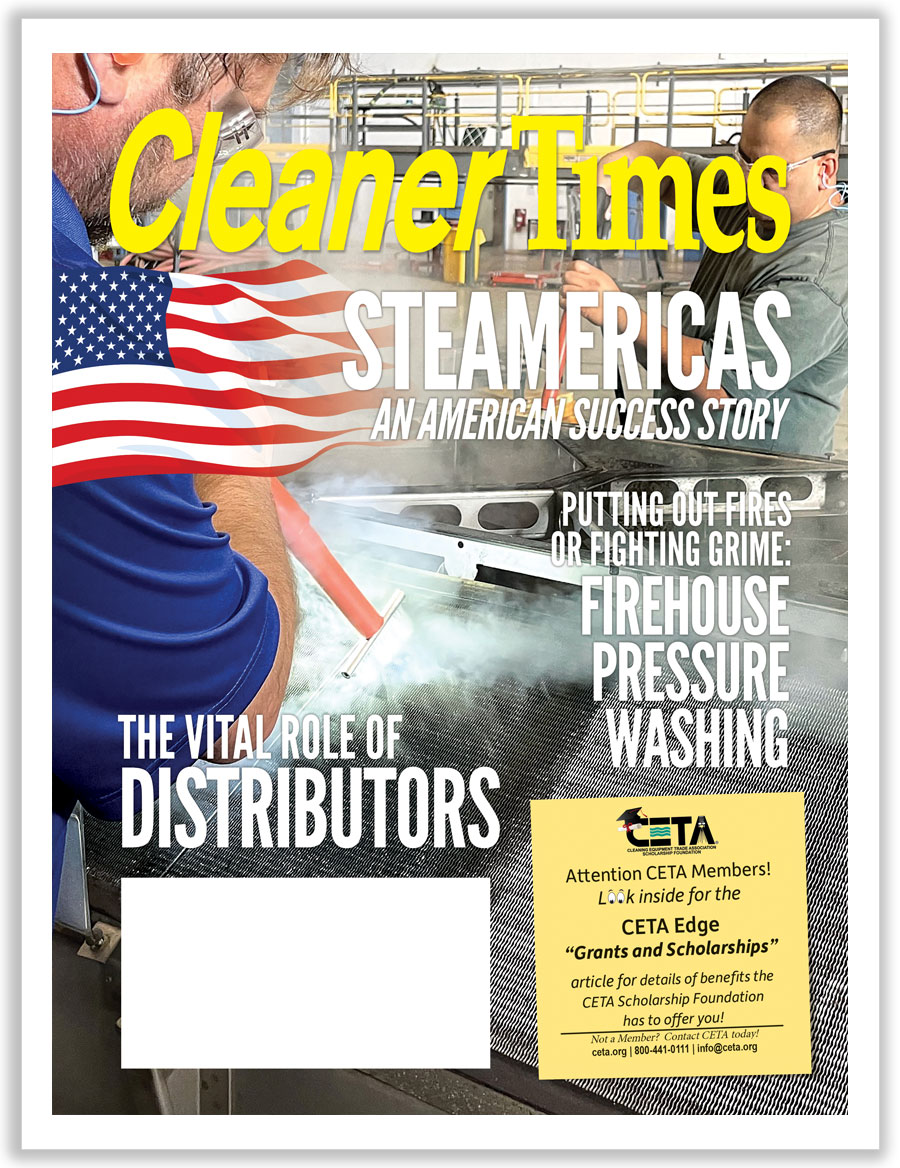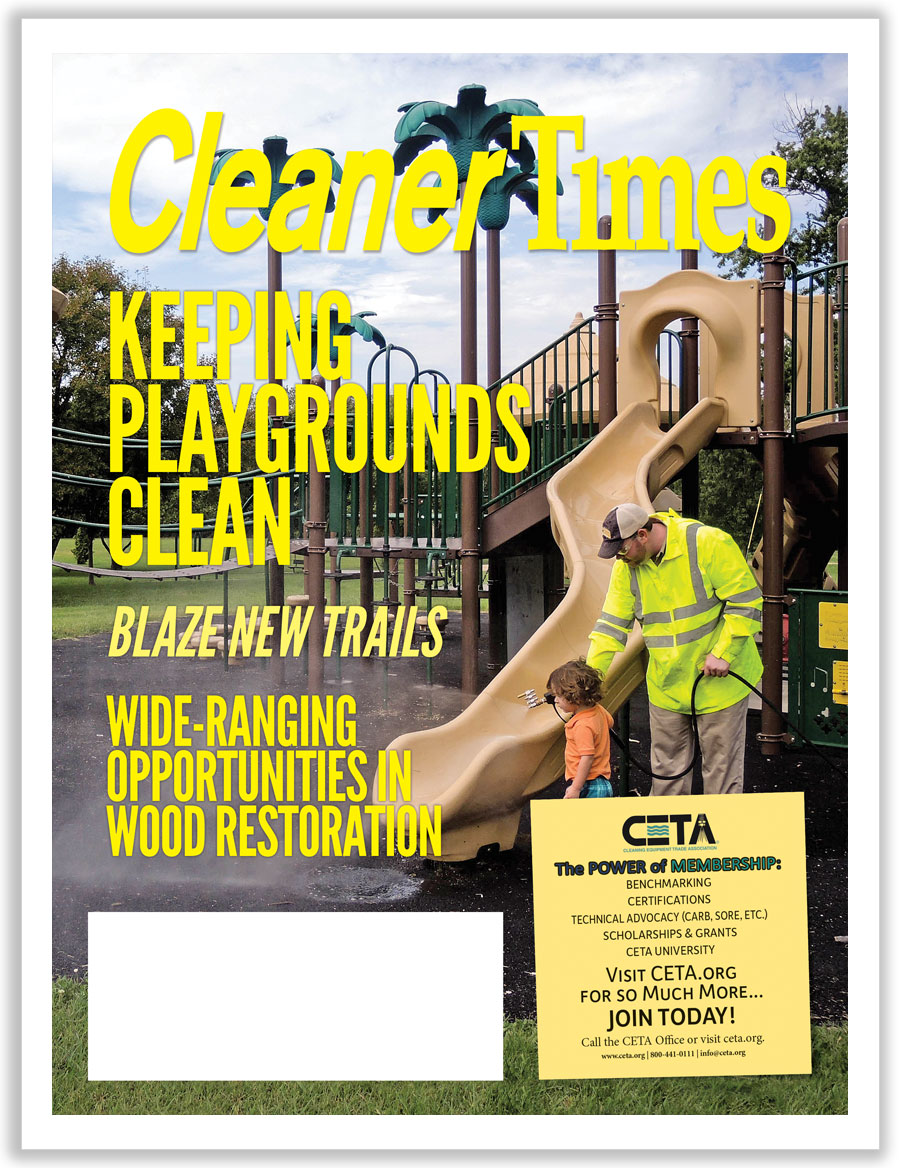
CETA Edge: Opportunities Are Where You Find Them
By Diane M. Calabrese / Published July 2014

New Markets
Opportunity knocks… well, sometimes. In fact, anyone taking a wait-and-see approach in 2014 is quite optimistic.
“Opportunities are where you find them,” says Roy Pennington, Owner, Hi Pressure Cleaning Systems Inc. in Houma, LA. “Note the key word, find them. Our company has not missed a CETA show in more than 20 years.”
Attending meetings of the Cleaning Equipment Trade Association gives Pennington an opportunity to listen, discuss, and refine his strategy. Listening transcends every setting—and it begins at home.
“We talk with every new team member,” says Pennington. “They do not know what we cannot do.” The “newbie” staffers are encouraged to bring every idea—even those considered a bit out-of-the-norm forward.
“Further, we listen to our customers,” says Pennington. That can be a source of new sales, as well as a way to help customers make optimal use of equipment. “A very basic premise at our company is ‘never give your customer a reason to call anyone else’—and they won’t.”
Pennington’s company does strong, international sales to the oil industry. Getting going in that sector meant working across many time zones and being online at two a.m. “I was checking e-mail from drilling rigs in Russia and the Mid-East where it was mid-morning,” he explains.
“By building and maintaining relationships for more than 10 years with purchasing agents in international drilling companies, we have earned their trust—and the ability to communicate directly with warehousemen, supervisors, and mechanics actually on the rig to best ascertain their needs for equipment and replacement of parts,” says Pennington. “Rather than describing parts, they send digital pictures of exactly what they need.”
Listen, understand, and respond— those are the essentials of identifying and entering new markets whether they are international or domestic. Take the time to understand the various special applications of the customer, says Pennington. For instance, some rigs his firm serves have conventional 440 volt, 60 cycle power (common in the United States). “Others operate on the European standard of 50 cycles, with voltages that include 240, 375, 400, 575, and 600 volts. We have sold equipment and parts for all these rigs by taking time to understand their needs and requirements—and providing them with outstanding service.”
A 24/7 service and availability response, which Pennington’s company offers, can give a big boost to sales, especially in sectors that run 24/7. “In the marine transportation industry, time is money,” says Pennington. “Time spent in port loading and unloading is kept to a minimum to maximize efficiency.” Having equipment in stock and ready to deliver when a ship arrives at the port in New Orleans is a must.
Shun Complacency
Do you want to find new markets? “Keep asking questions,” says Roy G. Chappell, CEO of Chappell Supply and Equipment in Oklahoma City, OK. “Get out there to visit existing customers and prospect for new ones.”
For prospective customers that don’t see an immediate need for equipment, ask questions that will reveal opportunities. “What is your largest and most difficult cleaning task?” is a good question, says Chappell. And don’t be afraid to cold call.
“Too many times, I think we get complacent out here,” says Chappell. “We think we don’t have to cold call anymore. Visit, ask questions, and learn from customers,” he explains. Also, be inventive and brainstorm about new markets. “Too often, we look at a list of existing customers and put blinders on,” says Chappell.
“Some of the new markets in our industry that I don’t think a lot of people pay attention to are casinos, restaurants, shopping centers, sports facilities, wineries, bakeries, hotels, hospitals, utility companies, seafood processors, offshore technology, and solid waste companies—every landfill probably has a dozen Caterpillars and compacters that have to be washed once a week to keep the radiator clean,” says Chappell. “There are also wind towers, food marketers, food processors, equipment that’s used for harvesting, and fabrication shops…”
More and more niches require not only the equipment to clean, but also the system to collect—and often treat—wastewater. Learn as much as possible about the customer.
“Wineries offer tremendous outlets for pressure washers,” says Chappell. Most municipalities do not want the nutrient-rich sludge from the winery going into their sewer system. And many wineries now collect wastewater, clean it, and use it for irrigation.
“Hospitals and nursing homes use pressure washers to wash bed frames, wheel chairs, and walkers,” says Chappell. That’s been going on for some 25 years.
“We sell to several large grocers,” says Chappell. “They are very intense on cleaning vegetable areas and meat areas.” The grocers generally use a hot-water pressure washer 10–15 hours each week.
Getting to know a prospective customer may not always be easy. Visit a chicken farm or a pig farm, and you will likely be required to wash and change before entering and exiting. “You have to disrobe, take a shower, and put on their garb,” explains Chappell.
Whichever route is taken to new markets, serve them well once they are on the client roster. Quality work brings referrals, says Chappell.
Get Out There
From directories and brochures to radio ads and social media, any method of making the initial connection with a new market has merit. Once the link is made, though, talking and listening solidify it.
Be open to new and industry-specific trade shows, says Chappell. The shows are a good place to make international connections.
Attending the CETA Annual Convention is where it begins. It’s the source of both ideas and colleagues. Throughout the year, Chappell talks with CETA colleagues by phone, exchanging ideas, and assessing what’s going on in different regions.
David Megathlin, a manager at BE Pressure Supply, Inc. in Abbotsford, British Columbia, Canada, also points to chats with customers as a source of new markets. “Getting information and suggestions from trusted customers is still the best way to find out about new markets,” he says. “And then, we create the right product to fit that need.”
International markets are a growing source of new markets, but they are also familiar territory for Megathlin’s firm. “We have been selling globally for a long time,” he explains. “We continue to see our market share grow exponentially in Europe, Asia, and South America.”
The co-location of CETA’s Annual Convention with ISSA this year looks particularly promising as a place to forge relationships. “We have met a few international dealers over the last two years at the PowerClean show and many of them at the ISSA show,” says Megathlin. “I expect that this year, with the ISSA show merging with the CETA show, we will get many more leads.”
Indeed, this year international markets will be within arm’s reach if not knocking at the door. CETA’s Annual Convention 2014 will co-locate with ISSA/INTERCLEAN® Orlando 2014. ISSA, the Worldwide Cleaning Industry Association, represents more than 6000 distributors and manufacturers, as well as providers of building contract services.
So while talking with customers, generating ideas, and innovating, take time for the basics and register for CETA’s Annual Convention 2014. “[The] bottom line is that shows bring companies the ideal venue to show off their new technology to their target audience,” says Rick Wendt, Director of Commercial Sales at Briggs and Stratton Corporation in Milwaukee, WI.





